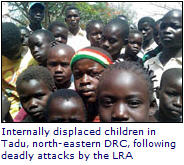
The United Nations refugee agency has reached towns in the strife-torn eastern Democratic Republic of the Congo (DRC), the scene of bloody attacks carried out by the notorious Ugandan rebel group known as the Lord’s Resistance Army (LRA).
Over the weekend, a team from the UN High Commissioner for Refugees (UNCHR) and other UN agencies carried out a mission in the towns of Tadu and Faradje in Orientale Province.
Faradje, which lies 100 kilometres west of the DRC’s border with Sudan and Uganda, was attacked from 25-26 December, leaving over 70 people dead and displacing nearly 40,000 others. Those who fled the town and local organizations said that more than 80 women were raped during the two-day period.
UNHCR said that people in the district are shocked and traumatized by the attacks. “Our mission found Faradje pillaged and destroyed by fire,” agency spokesperson Ron Redmond told reporters in Geneva.
Over 800 houses, three schools, government buildings and health care centres had burned, with most families losing their annual harvest in the fire.
The nearby village of Nagero came under attack on 3 January, claiming eight lives and uprooting 3,500 people.
Up to 500 Congolese civilians have been killed since the start of a joint Congolese, Sudanese and Ugandan operation against the LRA on 14 December, Mr. Redmond said.
According to UN estimates, over 50,000 people have been forced to flee their homes since mid-December, on top of 50,000 others in the region who were displaced by an earlier escalation of clashes between last September and November.
Mr. Redmond said the agency has received a preliminary report of another attack yesterday on the village of Napapo which claimed up to eight lives and houses were set on fire. “An unknown number of people were reportedly kidnapped,” he said, adding that there are reports that this incident has uprooted even more people.
The UNHCR team has met with local non-governmental organizations and the newly displaced are currently being registered in Tadu, Faradje and neighbouring villages.
Key needs include food, shelter and medicine, Mr. Redmond said. “However, the area remains highly volatile and insecurity is a key obstacle for access by us and other agencies.”
Related articles
- • Rwanda-Backed M23 Rebels Summarily Executed Children in Bukavu, UN Reports (February 19, 2025)
- • 'Deadly environment' plus 'political and social' obstacles hinder Ebola fight, Security Council hears (July 24, 2019)
- • Ebola outbreak declared an international Public Health Emergency (July 17, 2019)
- • UN Report Blames Ugandan Islamists for 237 Killings in DR Congo (May 14, 2015)
- • Violence in North Kivu Kills 21, Mostly Women, Children (October 18, 2014)
- • Kerry Calls on Kabila to Honor Constitution (May 4, 2014)
- • Security Council extends UN mission, intervention force in DR Congo for one year (March 28, 2014)
- • Death toll in Lake Albert boat accident rises to 251 (March 27, 2014)
- • U.S. sending more personnel to Uganda to hunt LRA leader Joseph Kony (March 24, 2014)
- • Death toll in Lake Albert boat accident rises to 108 people (March 24, 2014)
- • DR Congo Takes Chairmanship of COMESA at Summit in Kinshasa (February 26, 2014)
- • New DR Congo amnesty law welcomed by UN envoys (February 5, 2014)
- • Colonel Mamadou Ndala Is Killed in Ambush (January 2, 2014)
- • DR Congo, M23 Rebels Sign Declarations Marking End of Kampala Peace Talks (December 12, 2013)
- • No 'Peace Deal' With Defeated M23 Rebels, DR Congo Says (November 11, 2013)
- • Congo Will Not Sign a 'Peace Deal' With Defeated M23 Rebels, Government Says (November 6, 2013)
- • Congo Army Takes Control of Mbuzi Hill From M23 Rebels (November 4, 2013)
- • Kabila Congratulates Congo Army for Defeating M23 Rebels (October 30, 2013)
- • Congo Army Liberates Rutshuru, Kiwanja and Kibumba From M23 Rebels (October 27, 2013)
- • Congo Army Dislodges M23 Rebels From Strategic Town of Kibumba (October 26, 2013)
- • Congo Army Takes Control of Kibumba After Fighting With M23 Rebels Resumes (October 25, 2013)
- • Rwandan Support for M23 Rebels Frustrates Attempts to End Fighting in Eastern Congo (September 26, 2013)
- • Rwanda 'recruiting for M23 rebels' (July 31, 2013)
- • UN Security Council debate focuses on peace efforts for Africa's Great Lakes region (July 25, 2013)
- • Warlord Bosco Ntaganda Turns Himself In at US Embassy in Rwanda (March 18, 2013)
- • Regional Leaders Sign DR Congo Peace Deal (February 24, 2013)
- • Obama Tells Kagame to Stop Support for M23 Rebels in Eastern Congo (December 19, 2012)
- • UN Security Council Condemns Latest M23 Attacks, Extends Sanctions on Rebels (November 28, 2012)
- • The M23 Rebels Want to Overthrow Kabila? Nonsense (November 28, 2012)
- • Thousands of Women March Against M23 Rebels in Kinshasa (November 24, 2012)
Tags: |







